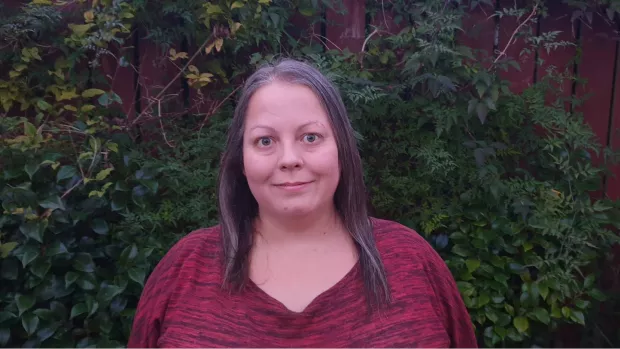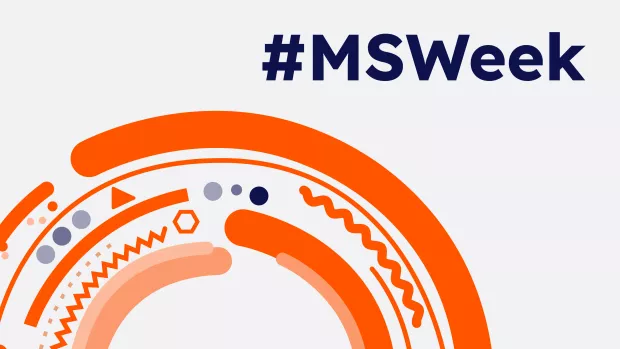
"Fear and shame have stopped me talking about some MS symptoms"
After the shock of her MS diagnosis aged 22, Paige had to find ways to deal with symptoms she found embarrassing. But with some self-love she’s found the confidence to be more open and get the help she needs.
I live in Dundee with my partner Ace. In my spare time I like to knit, sew and play with my cats.
MS is such an invisible condition. So many of the symptoms are hidden and you feel like you have to justify everything. So I’m always worried about whether I’ll be believed. My partner’s great at reminding me it’s healthcare professionals’ job to help with these things and they will believe me.
And due to embarrassment, I’ve hidden some of my MS symptoms – especially around mental health, bladder issues and sex. These can be hard to talk about, and I don’t want to worry my family.
Being diagnosed with MS at 22 was a shock
I was diagnosed with MS in 2022, following a lot of symptoms. These included epilepsy-like symptoms, partial seizures, migraines and numbness. I was 22, and it felt catastrophic at the time. I was very shocked by the diagnosis and I felt a bit hopeless.
Read more about early signs of MS
What helped me get past this was my treatment plan and knowing that going ahead with Tysabri gives me the best chance at a good life with MS.
I still experience a lot of fatigue, and migraines are a big part of my life. But we’re getting on top of the migraines with medication, thankfully. I have some spasticity and I get quite shaky a lot.
My speech can be affected – I can get tongue tied and forget words. Sometimes I don’t apply for jobs because I worry people won’t take me seriously.
I’ve put off talking about some symptoms for too long
I find hard to talk about my mental health. I experience a lot of anxiety around MS, and every time I don't feel my best I struggle. When I'm in a flare-up, I often feel depressed. It's hard to push through and leave the house when you've been feeling rubbish for days.
I feel vulnerable whenever I leave the house. I worry about people staring at me, as chances are I'll be the only one in the room using mobility aids.
Therapy has helped a lot. It helped me grieve the body that I had before MS.

But, what changed things for the better the most for me was meeting Evie through the Buddy Network at Shift.MS, it gave me the opportunity to meet someone with MS, she made me feel seen and I'm lucky I get to call her my friend. She changed everything for me.
It’s embarrassing to talk about sexual stuff
Sexual sensations have felt different for me since getting MS, but I’ve still not spoken to a healthcare professional about it. When I go for my appointments I convince myself it’s so minor and that they don’t want to hear about it. I feel embarrassed about raising sexual problems because it makes me feel like I’m not functioning well as a person.
Some things feel very private and we don’t really talk about them at home. Talking about them at all can be hard to be honest.
I didn't want to admit it. Not even to myself, I just kind of crossed my fingers and hoped it went away. It didn’t, and over time my partner started to feel that I’d lost interest. I hadn't, I just didn't want to admit something wasn't right. Speaking about it has helped us come together again and going on regular dates nurtures our relationship in another way.
I’ve felt too embarrassed to talk to my health care team, too. I’ve put off talking about things for way longer than I should have.
I once had a urine infection, which is pretty common with MS. But I put asking for help off for several weeks before my partner said "I’m phoning the doctor for you, enough is enough." The impact of the infection was bigger because I just tried to flush it out myself, which didn’t work.
Fear stops me from talking about these symptoms – the fear of letting people down. And a bit of shame.
Self-love has given me the confidence to open up
I’ve kind of overcome this embarrassment by being the loudest version of myself that I can be. I don’t want to be in people’s faces too much, but I’d rather just say it and have it out there, than keep it in any longer.
Finding ways to show myself love gives me the confidence to talk about these things. Reminding myself that I’m valuable and important, and that sharing my symptoms could be valuable for others. All of that gives me the confidence.
I think a lot of people are like me – we sit at home and worry about these things and don’t share them with anyone. Social media and disabled influencers have really helped normalise MS and disability for me. It made me talk about my embarrassing symptoms with my family and friends.
If other people can find value and meaning in their lives with a disability then I can too. If others can know their worth and feel beautiful with mobility aids then I can too. Life with MS is just as valuable and meaningful as anyone else's. Life is both beautiful and messy no matter what life you live, disabled or not.
When I first saw somebody with MS online being honest it made the difference for me. I now know that putting myself out there might do the same for someone else.


